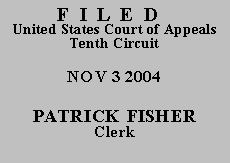

| DAMION JOHNSON, | No. 04-5050
(D.C. No. CV-01-154-C (J)) |
On appeal, Johnson asserts four grounds for habeas relief: 1) an eight-year-old witness's trial testimony identifying Johnson as the shooter was tainted by an overly suggestive pretrial identification, depriving Johnson of due process; 2) there was insufficient evidence to support either conviction; 3) the prosecutors made numerous improper remarks during trial; and 4) defense counsel was ineffective in failing to request the trial court give the jury an alibi instruction.(1) The district court denied habeas relief and a certificate of appealability (COA).
A habeas petitioner must obtain a COA before proceeding on appeal. See 28 U.S.C. § 2253(c)(1). To be entitled to a COA, Johnson must make a "substantial showing of the denial of a constitutional right." Id. § 2253(c)(2). To make this showing, Johnson must establish that "reasonable jurists could debate whether (or for that matter, agree that) the petition should have been resolved [by the district court] in a different manner or that the issues presented were adequate to deserve encouragement to proceed further." Slack v. McDaniel, 529 U.S. 473, 483-84 (2000) (quotations omitted).
Johnson has failed to make that showing. As to Johnson's first, third and fourth grounds for relief, we DENY COA for substantially the same reasons the district court denied habeas relief.
As to his second ground for relief, challenging the evidence's sufficiency to support both convictions, the district court deemed Johnson to have failed to raise that claim on direct appeal and, thus, to have now procedurally defaulted that claim. We disagree, concluding instead that Johnson did adequately raise that issue on direct appeal. Nevertheless, after having carefully reviewed the trial record, we conclude that there was clearly sufficient evidence to support both Johnson's convictions.
For all of these reasons, then, we DENY Johnson a certificate of appealability and DISMISS this appeal.
ENTERED FOR THE COURT
David M. Ebel
Circuit Judge
1. In the district court, Johnson also argued that the trial court erred in not sua sponte instructing the jury on his alibi defense. Johnson, however, does not specifically reassert that claim now on appeal. It would, in any event, not warrant a certificate of appealability.